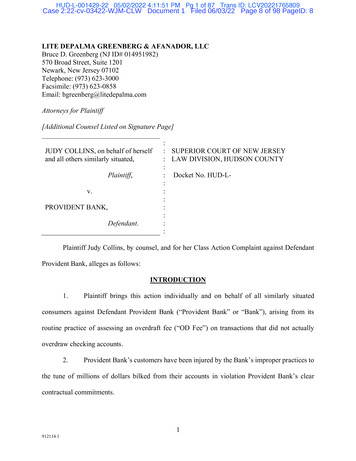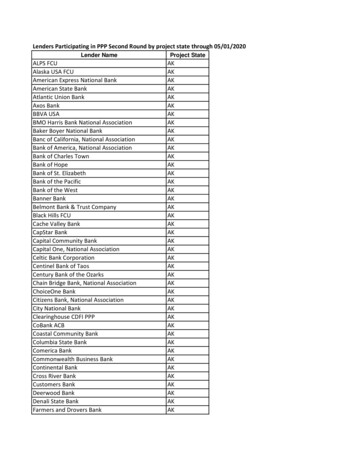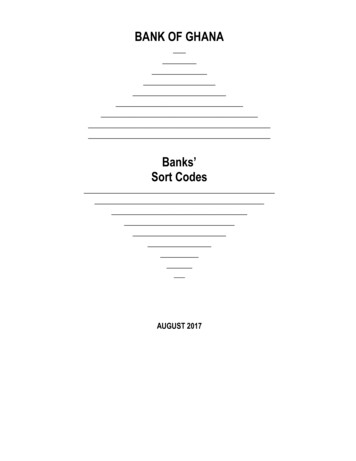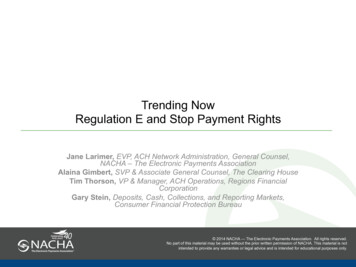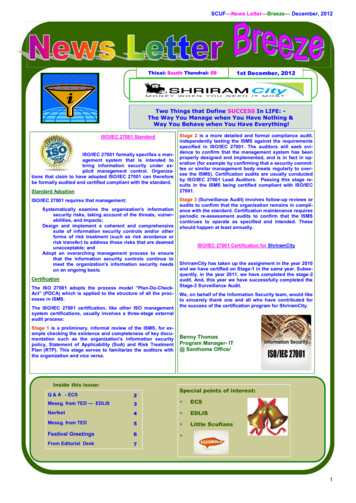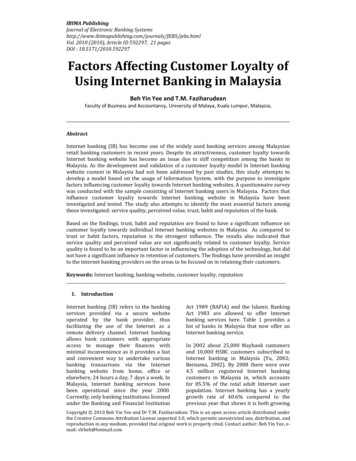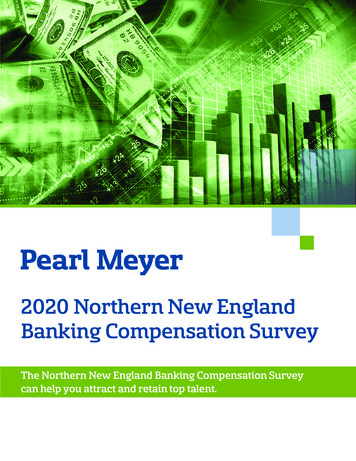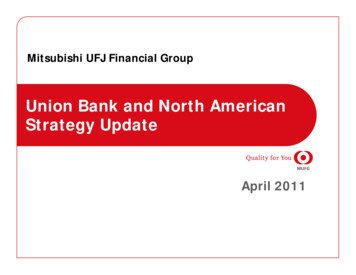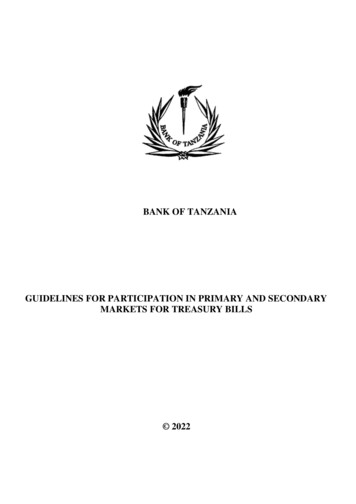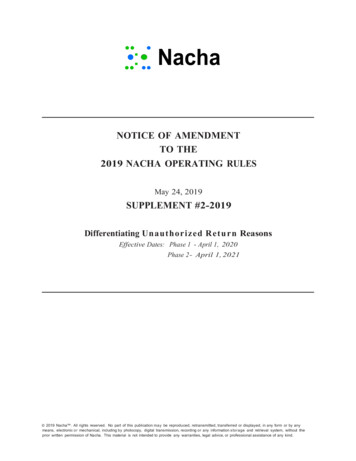
Transcription
: NachaNOTICE OF AMENDMENTTO THE2019 NACHA OPERATING RULESMay 24, 2019SUPPLEMENT #2-2019Differentiating Unau thorized R et u rn ReasonsEffective Dates: Phase 1 - April 1, 2020Phase 2- April 1, 2021 2019 Nacha . All rights reserved. No part of this publication may be reproduced, retransmitted, transferred or displayed, in any form or by anymeans, electronic or mechanical, including by photocopy, digital transmission, recording or any information storage and retrieval system, without theprior written permission of Nacha. This material is not intended to provide any warranties, legal advice, or professional assistance of any kind.
SUPPLEMENT #2-2019 TO THE N A C H A OPERATING RULESSupplement #2-2019 to theNACHA Operating RulesOn April 12, 2019, the Nacha Voting Membership approved an amendment to the NACHA Operating Rules(Rules) on Differentiating Unauthorized Return Reasons. The effective dates for this rule c h a n ge are April1, 2 0 2 0 and April 1, 2021.The D i f f e r e n t i a t i n g Unauthorized Return Reasons Rule (Rule) is d es i g n e d to b et te r distinguish amongtypes of u n a u t h o r i z e d return reasons for c o n s u m e r debits. This differentiation will gi ve ODFIs andtheir Originators clearer and better information when a customer claims that an error occurred with anauthorized payment, as opposed to when a customer claims there was n o authorization for a payment. ODFIsand their Originators will be able to react differently to claims of errors, and potentially could avoidtaking more significant action with respect to such claims. The R u l e will al so allow collection of betterindustry data on unauthorized activity.In a d d i t i o n , language within the Rules regarding Written Statements of U n a u t h o r i z e d Debits will b emodified to accommodate the n e w l y defined return reason, but there will be no additional substantivechanges to the WSUD rules.This s u p p l e m e n t provides ACH Network participants with a summary of the k e y c o m p o n e n t s of e a chchange, along with details regarding the technical changes to Rules language. To ensure compliance with themost current rules, this Supplement should be used in conjunction with the 2019 edition of the Rules.1 2019 Na cha '"
SUPPLEMENT #2-2019 TO THE N A C H A OPERATING RULESDifferentiating Unauthorized Return ReasonsSUMMARYCurrently, Return Reason Code Rl0 is a catch-all for various types of underlying return reasons, includingsome for which a valid authorization exists, such as a debit on the wrong date or for the wrong amount. Inthese situations, there is an actual relationship and payment authorization between the Originator and itscustomer (the Receiver), but t h e O r i g i n a t o r made an error regarding the p a y m e n t . For these cases, areturn of the debit still should be made, but the Originator and the Receiver might both benefit from acorrection of the error rather than more significant action such as the termination of the originationauthorization.Under the Rule, Return Reason Code Rll will be re-purposed to be used for the return of a debit inwhich there is an error, but for which there is an authorization. The r e -purposed description will b e"Customer Advises Entry N o t in Accordance with the Terms of the Authorization." Return Reason Code Rl0will continue to be used when a consumer claims he or she does not know the Originator, does not havea relationship with the Originator, or did not give authorization for the entry. The d e s c r i p t i o n will be"Customer Advises Originator is Not Known to Receiver and/or Is Not Authorized by Receiver to DebitReceiver's Account"Rll returns will have the s a m e processing requirements and characteristics as Rl0 returns, and are stillconsidered unauthorized under the Rules. Incorrect EFTs are subject to the same error resolution procedures under Regulation E as unauthorizedEFTs. The RDFI will be required to obtain the Receiver’s Written Statement of Unauthorized Debit. The return timeframe will be 60 days. Rll returns will be i n c l ud e d within the def ini tion and c a l c u l a t i o n of the U n a u t h o r i z e d Entry ReturnRate. Rll returns will be covered by the existin g Unauthorized Entry Fee. (see Ef fe ct i ve Date section) The new definition and use of Rll does not include disputes about goods and services, just as with thecurrent definition and use of Rl0.A key difference between Rl0 a n d Rll will b e t h a t an O r i g i n a t o r will b e permitted to c o r r e c t theunderlying error of an Rll return, if possible, and submit a new Entry without being required to obtain anew authorization. The n e w Entry m u s t be o ri gin at ed within 60 days o f the S e t t l e m e n t Date of the RllReturn Entry. In addition, any new Entry for which the underlying error is corrected is subject to thesame ODFI warranties and indemnification made in Section 2.4 (e.g., the ODFI warrants that thecorrected new Entry is in accordance with the terms of the authorization, it is timely, contains the correctamount, etc.).Examples of correctable errors include a debit originated for settlement earlier than authorized; a debit fort h e wrong amount; a debit as part of an Incompl ete Transaction; and some types of an improperlyreinitiated Entry. Once the O r i g i n a t o r has c o r r e c t e d the u n d e r l y i n g issue, the O r i g i n a t o r will b ea bl e to submit a new Entry. Some errors, however, cannot be c o rrec t ed . Examples of uncorrectable errorsinclude the Originator did not provide the required notice for ARC, BOC, or POP entries prior to acceptingthe check, or the notice did not conform to the requirements of the Rules; or the source document for anARC, BOC or POP Entry was ineligible for conversion. In these cases, the Originator will not be a b l e t osubmit a new Entry.2 2019 Na cha '"
SUPPLEMENT #2-2019 TO THE N A C H A OPERATING RULESIMPACT TO PARTICIPANTSOriginators: Originators will need to be aware of the differences between returns bearing the R10 andR11 Return Reason Codes and m o d i f y their procedures accordingly.ODFIs: ODFIs will need to educate their staff and Originators on the changes to Return Reason CodesR10 and Rll. ODFIs will need to update their systems to accommodate there-purposing of Rll, includingmodifications to return reporting and tracking capabilities.Third-Party Service Providers and Third-Party Senders: These ACH participants will need to educate theirstaff and Originators on the c h a n g e s to Return Reason Codes RI0 and R l l . When necessary, these ThirdParties will n e e d to u p d a t e their systems to a c c o m m o d a t e the re-purposing of R l l , includingmodifications to return reporting and t r a c k i n g capabilities.ACH Operators: ACH Operators will need to update their systems to accommodate the re-purposed R l l ,including ODFI R e t u r n Rate Reporting and app li c at ion of Unauthorized Entry Fees.RDFIs: RDFIs will need to educate their staff on the proper use of the Return Reason Codes, as well asupdate their systems to change the R11 return time frame to the 60 day window. RDFIs may a l so wishto review the format of their Written Statements of Unauthorized Debit to determine if any revisions areappropriate to facilitate updated use of these return codes.EFFECTIVE DATEThe Rule will become effective in two phases. On April 1, 2020, the re-purposed return code will becomeeffective, and financial institutions are t o use i t for its new purpose. Other provisions in the R u l e s thatapply to unauthorized returns will become effective at this time with respect to R l l s - i.e., Unauthorized EntryR e t u r n Rate and i t s relationship to ODFI Return Rate Reporting obligations.A year later, on April 1 , 2021, the re-purposed return code will become covered by the existing UnauthorizedEntry Fee. This part of the Rule will be implemented by the ACH Operators, and a s with the current fee, will bebilled/credited on their monthly statements of charges.TECHNICAL SUMMARYBelow is a summary of t h e impact of t h e D i f f e r e n t i a t i n g Unauthorized Return Reasons Rule o n t h eNACHA Operating Rules. Sections of the R u l e s that are a f f e c t e d by this a m e n d m e n t are i n c l u d e d andreflect rule language as it will read upon implementation in highlighted, italicized text. Article One, Subsection 1.11.1 (General Rule on Unauthorized Entry Fee) - updated to include ReturnReason Code R 1 1 . * Article Two, S u b s e c t i o n 2.12.4.1 (General Rule f o r R e i n i t i a t e d Entries) - modified to treatnew corrected Entry differently from a Reinitiated Entry. Article Two, Subsection 2.12.5 (Correction of Entries Returned as R11 - Customer Advises Entry Not inAccordance with the Terms of the Authorization) - new subsection added to permit submission ofcorrected Entry and prohibit submission of uncorrectable Entry. Article Three, Section 3.11 (RDFI Obligation to Recredit Receiver) - updated structure to align withbroader concepts of unauthorized Entries and a utho rize d Entries that are not in accordance with theEffectiveApril1, 2021*3 2019 Na cha '"
SUPPLEMENT #2-2019 TO THE N A C H A OPERATING RULESauthorization. Article Three, Section 3.12 (Written Statement of Unauthorized Debit) - updated structure to a l i g nwith broader concepts of unauthorized Entries and autho riz ed Entries that are not in accordance withthe authorization. Article Three, Subsection 3.12.1 (Unauthorized Debit Entry/Authorization for Debit Has Been Revoked)- updated structure to align with broader concepts of unauthorized Entries (including authorizationrevoked) and a utho riz ed Entries that are not in accordance with the authorization. Article Three, Subsection 3.12.2 (Debit Entry not in Accordance with the Terms of the Authorization)- revised to describe conditions in which Rll would be used. Article Three, Subsection 3.12.2.1 (Improper ARC, BOG and POP Debit Entries) - minor modification tolimit discussion of this subsection to ARC, BOC and POP En t ri e s . Article Three, S u b s e c t i o n 3.12.3 (Improperly Originated RCK Entry) - minor modification to limitdiscussion of this subsection to RCK Entries. Article Three, Subsection 3.12.4 (Form of Written Statement of Unauthorized Debit) - modified toeliminate redundancy with new and r e v i s e d text. Article Three, Subsection 3.12.6 (Copy of Written Statement of Unauthorized Debit) - updated to notethat the OD FI m u s t request a copy of the Written Statement of Unauthorized Debit within one year ofthe Settlement Date of the Ext e n d e d Return Entry. Article Eight, Section 8.111 (Unauthorized Entry Fee) - updated to include Rll.* Article Eight, Section 8.112 (Unauthorized Entry Fee Return Rate) - updated to include Rll. Article Eight, Section 8.117 (Written Statement of Unauthorized Debit) - updated structure to alignwith broader concepts of u n a u t h o r i z e d Entries (including authorization revoked) and authorizedEntries that are n o t in accordance with the authorization. Appendix Three, Subpart 3.2.2 (Glossary of D a t a Elements): Addenda Information -modified t ostrike reference to Rll. Appendix Four- Return Entries (Introduction) -modified to strike reference to Rll. Appendix Four, Subpart 4.2 (Table of Return Reason Codes) - updated to include revised titles anddescriptions for R l 0 and R l l .As approved April 12, 2019, effective April 1, 2020 and April1, 2021, the Rules will be amended as followsfor changes related to Differentiating Unauthorized Return Reasons:* Effective April 1, 202124 2019 Na cha '"
SUPPLEMENT #2-2019 TO THE N A C H A OPERATING RULESARTICLE ONEGeneral RulesSECTION 1.11 Unauthorized Entry FeeSUBSECTION 1.11.1 General Rule on Unauthorized Entry FeeAn ODFI a g r e e s to pay an Unauthorized Entry Fee to the r e s p e c t i v e RDFI for a debit Entry (except for adebit IAT Entry) that is returned to the O D F I with a Return Reason Code of R05, R07, Rl0, R29, or R51.An ODFI agrees to pay an Unauthorized Entry Fee to the respective RDFI for a debit Entry (except for adebit IAT Entry) that is Returned to the ODFI with a Return Reason Code of R05, R07, Rl0, Rl1,* R29, orR51.The National Association, in coordination with the ACH Operators, will arrange for a system for thecollection and distribution of Unauthorized Entry Fees from and to the Federal Reserve accounts thatParticipating DFIs use for settlement of their ACH activities.ARTICLE T W ORights and Responsibilities of ODFIs, Their Originators, and Third-PartySendersSECTION 2.12 Return EntriesSUBSECTION 2.12.4 Reinitiation of Returned EntriesSUBSECTION 2.12.4.1 General Rule for Reinitiated EntriesAn Originator or ODFI may r e i n i t i a t e an En tr y, other than an RC K Entry, that was p r e v i o u s l y returned,only if:(a)the Entry was r e t u r n e d for insufficient or uncollected funds;(b)the Entry was Returned for stopped payment and Reinitiation has been separately authorized bythe Receiver after the Originator or ODFI receives the Return Entry; or(c)The O r i g i n a t o r or ODFI has taken corrective action to remedy the reason for the return.The Originator or O D F I m u s t reinitiate the Entry within 180 days after the Settlement Date of t h eoriginal Entry. An Originator or ODFI may Reinitiate an Entry that has been returned for insufficient oruncollected funds a maximum of two times following the Return of the original Entry.An Originator or ODFI ma y r e i n i t i a t e an RCK Entry that was p r e v i o u s l y returned if:(d)the R C K Entry has been returned for insufficient or uncollected funds; and(e)the item to which the RCK Entry relates has been presented no more than one time through thecheck collection system (as a Check, substitute check, or image) and no more than one time asan RCK Entry.*Effective April 1, 20215 2019 Na cha '"
A debit Entry will not be treated as a Reinitiated Entry if:(f)the debit Entry is one in a series of preauthorized, recurring debit Entries and is not contingentupon whether an earlier debit Entry in the recurring series has been Returned; or,(g)the Originator obtains a new authorization for the debit Entry after it receives the original ReturnEntry; o r,(h)the debit Entry is initiated to the Receiver's correct account following the return of a previousEntry using Return Reason Code R03 (No Account/Unable to Locate Account) or R04 (InvalidAccount Number Structure); or(i)the debit Entry is initiated to the Receiver's account following the return of a previous Entryusing Return Reason Code Rll (Customer Advises Entry Not in Accordance with the Terms of theAuthorization), and the error or defect in the previous Entry has been corrected to conform to theterms of the original authorization, in accordance with the requirements of Subsection 2.12.5(Correction of Entries Returned as Rll}.SUBSECTION 2.12.5 Correction of Entries Returned as R11 (Customer Advises Entry Not inAccordance with the Terms of the Authorization) (new subsection)An Originator that has received a Return Entry using Return Reason Code Rll (Customer Advises Entry Notin Accordance with the Terms of the Authorization) may correct, if possible, the error or defect in theoriginal Entry and Transmit a new Entry that conforms to the terms of the original authorization, withoutthe need for re-authorization by the Receiver. The Originator must transmit the new Entry within 60 days afterthe Settlement Date of the Return Entry.The following errors causing the return of the original Entry as Rll cannot be corrected by the Originator,and t r a n s m i s s i o n of a new Entry in these cases is prohibited:(a) the Originator did not provide the required notice for an ARC, BOC, or POP Entry prior toaccepting the check, or the notice did not conform to the requirements of these rules; or(b)the source document for an ARC, BOC, or POP Entry was ineligible for conversion.
Below is a summary of the impact of the Differentiating Unauthorized Return Reasons Rule on the NACHA Operating Rules. . Subpart 4.2 (Table of Return Reason Codes) - updated to include revised titles and descriptions for Rl 0 and Rll . As approved April 12, 2019, effective April 1, 2020 and April1, 2021, the Rules will be amended as follows .
